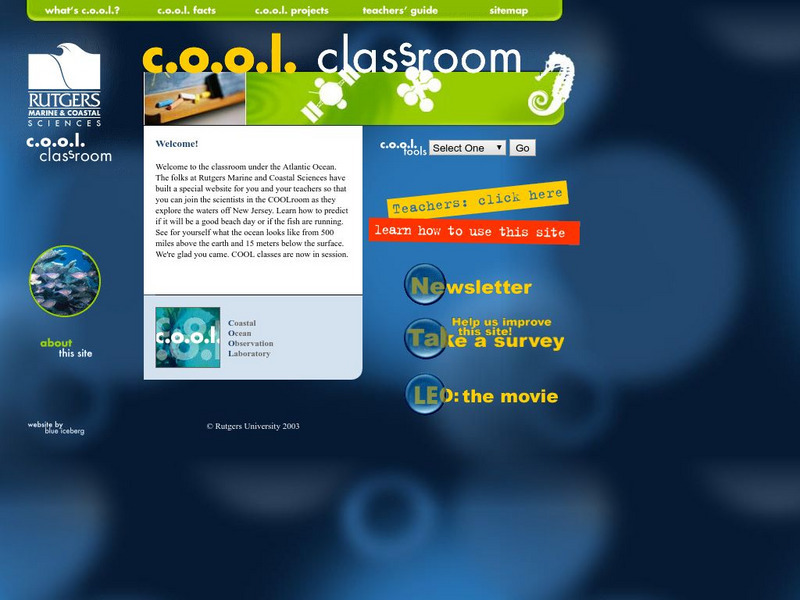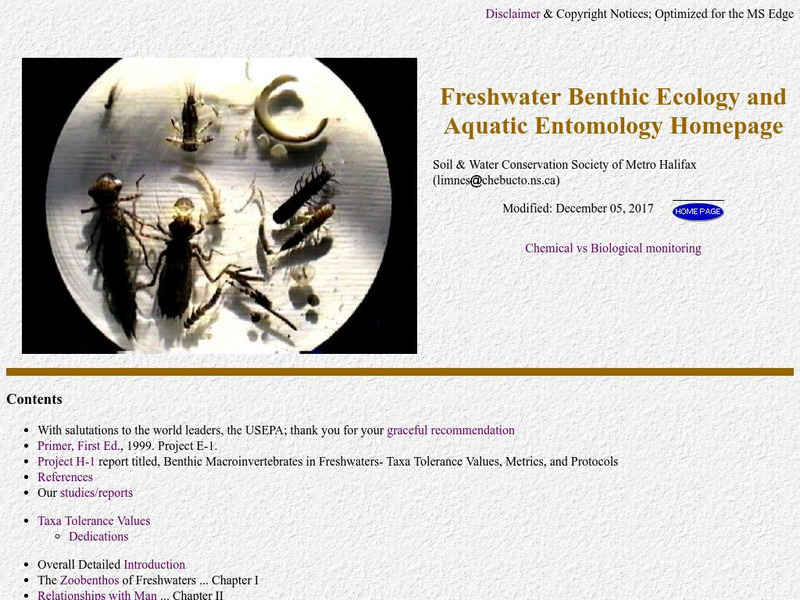Hi, what do you want to do?
Curated OER
Changing Planet: Rising Ocean Temperatures - Rising Sea Levels
As an anticipatory set, young environmental technicians watch a video about how ocean temperatures seem to be changing along with the global climate. They perform a laboratory demonstration with the purpose of observing what happens to...
Curated OER
Research Question, Hypothesis and Experimental Design
Students discuss steps of the scientific process, as well as, observe a picture of the beach that they will visit. Students create a testable hypothesis about marine debris at the beach. In this science lesson, students create a...
Curated OER
Shipwreck Mystery
Students study web pages on a shipwreck then locate where this took place on a map. In this marine archaeologist lesson students examine what clues archaeologists use to find the location of a shipwreck and what they might find.
Curated OER
Animal Characteristics
Students investigate the characteristics of animals by creating a chart. In this animal life lesson, students create a KWL chart listing all the different animals a class can name. Students take a field trip to a science facility to get...
Curated OER
Why Are The Shore Birds Dying?
Students engage in a field study of birds and how they are in danger harm due to environmental factors. They list different possible causes in a prediction activity. The observations are done while writing up data and connecting it to a...
Curated OER
Catalase: A Bioinformatics Case Study
Students investigate the physical structure of a protein by using a computer simulation tool. They record its primary amino acid structure while viewing it in three dimensions for a better visual recognition. There is also a comparison...
Curated OER
Scientists Write!
Students use a journal to record observations. They make notes about what research may be needed to answer questions that have come up in the field and sketch or make connections in the curriculum. They research bioinformatics and...
Curated OER
Ocean Habitats:
Students investigate the creatures of intertidal zones. They explore the adaptations species make to survive .
Curated OER
Busy Otters
Students prepare for a trip to an aquarium by identifying otters, their body parts and behaviors as they read "Pup's Supper", do an otter pantomime and make a puppet. After their field trip, they complete a Venn Diagram of Otter behaviors.
Curated OER
Lesson on GPS
Students investigate global positioning systems. In this technology and mapping lesson plan, students view a PowerPoint presentation in which they identify the features of a GPS, state its uses, and follow steps to find a waypoint.
Curated OER
Trash on Texas Beaches
Young scholars take a field trip to a local Texas beach. Using the trash and debris they find, they classify them based on specific criteria. In groups, they calculate the total for each category and determine the percentage of each...
Kenan Fellows
Determining Stream Health by the Diversity and Types of Benthic Organisms
How diverse are the benthic organisms found in local streams? Using the information learned in previous lessons on identification of macroinvertebrates and on calculating stream index values, groups determine the health of local...
Curated OER
BIoluminescence
Students investigate the concept of bioluminescence. They use dinoflagellates in a lab situation to study photosynthesis. They conduct research into the concept using a variety of resources. Also the class is taken on a field trip to...
Curated OER
Mud in the Water
Sixth graders investigate erosion. In this erosion instructional activity, 6th graders explore how farming changes the environment. Students construct an erosion model and research ways to protect the soil from excess mud generated by...
Curated OER
Mud in the Water
Students build a soil erosion model to study the importance of soil conservation. They investigate how land forms from both constructive and destructive forces.
Curated OER
Phragmites australis: Invasive Plant Species
Students research and investigate invasive species, with specific focus on the exotic plant Phargmites australis and its impact on Piermont Marsh near the community of Piermont, New York.
Curated OER
Microfishing
Students use a simple method to collect living microorganisms from natural and/or artificial environments and develop skills in microscopy, observation, drawing, speculation, hypothesizing, oral presentation, and raising questions.
Curated OER
The Key To Classifying Animals
Explorers of the environment construct a dichotomous key for a variety of organisms and design a key to classify Galapagos animals based on descriptions and images. The lesson includes a link to an animal gallery and the worksheet for...
Curated OER
What Does it Take to be a Survivor: Part 2
Students explore adaptation by completing worksheets. In this fish anatomy lesson, students identify the different survival strategies fish utilize to live in the ocean and the adaptation their bodies have gone through over millions of...
Curated OER
Utilizing Community Resources
Students gain an understanding of scientific methods and use process skills (such as observing, classifying, and predicting) to solve a problem. They develop an understanding of the need for natural preservation.
Other
Rutgers Marine & Coastal Sciences: Cool Classroom
Students and teachers can explore the work of marine scientists and observe the ocean from their computers. Learn about Rutgers Coastal Ocean Observation Laboratory, discover why oceanography is important, and see what life is like in...
Other
Freshwater Ecology
This is a comprehensive and detailed site providing information on aquatic macroinvertebrates. The emphasis is on biomonitoring of water quality through quantitative assessment of numbers and types of small aquatic organisms.
Science Education Resource Center at Carleton College
Serc: Investigating Rock Layers and Fossils to Infer Past
This activity is an inquiry-based field investigation of the sedimentary geology of Lilydale Regional Park's brickyards area, a bluff and slope location near St. Paul Minnesota's Harriet Island and Cherokee Heights Park. Learners...
Science Education Resource Center at Carleton College
Serc: Two Types of Journaling Before Pond Study
During the lab, students investigate the interaction of living and nonliving environmental factors affecting a run off pond near the school.




























